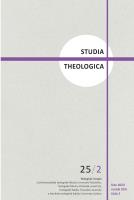Společné dobro: minimalistické, instrumentální, či robustní?
The Common Good: Minimalistic, Instrumental or Robust?
Author(s): Jiří BarošSubject(s): Social Sciences, Law, Constitution, Jurisprudence, Political Theory, Theology and Religion
Published by: Univerzita Palackého v Olomouci
Keywords: Authority; Common Good; Family; John Finnis; John Rawls; Justice; Liberalism; New Natural Law Theory; Obedience to Law; Peace; Political Theory; Reasons for Action; Thomism;
Summary/Abstract: The aim of this article is to present and contrast various competing concepts of the common good. In the first part of the article, I critically discuss the minimalistic concept, which can be found in the celebrated book A Theory of Justice written by the American philosopher John Rawls. I subsequently deal with the instrumentalist concept, which brought fame to John Finnis, the most prominent representative of the so-called new natural law theory. According to Finnis, the common good serves as an instrument regarding the basic human goods of marriage and family life. In the third part, the instrumentalist concept is the target of my criticism, which leads me to a defense of a more robust concept of the common good. In three steps, I demonstrate that Finnis misunderstands the order of goods, elevates the common good of family and other private associations without appropriate reasons, and diminishes the common good of the political community. Because of this, the common good is not able to offer appropriate normative reasons for the exercise of such risky professions as soldiers and police officers. In contrast, the robust concept of the common good, as recently advocated most prominently by the Australian philosopher George Duke, enables one to solve these problems. It also provides a better solution to the delicate question of obedience to political authority.
Journal: Studia theologica
- Issue Year: XXV/2023
- Issue No: 2
- Page Range: 191-213
- Page Count: 23
- Language: Czech

